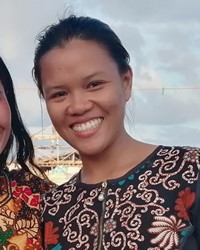Sama, Central in Philippines

Photo Source:
Reigthzhyl Zrcn
|
Send Joshua Project a map of this people group.
|
| People Name: | Sama, Central |
| Country: | Philippines |
| 10/40 Window: | No |
| Population: | 139,000 |
| World Population: | 162,000 |
| Primary Language: | Sama, Central |
| Primary Religion: | Islam |
| Christian Adherents: | 5.00 % |
| Evangelicals: | 2.00 % |
| Scripture: | New Testament |
| Ministry Resources: | Yes |
| Jesus Film: | Yes |
| Audio Recordings: | Yes |
| People Cluster: | Filipino, Muslim |
| Affinity Bloc: | Malay Peoples |
| Progress Level: |
|
Introduction / History
The Sama peoples were originally in the islands and coastal areas separating southwestern Mindanao from the northeastern islands of Sulu. They probably first began to disperse sometime in the first millennium A.D. because of expanding Chinese trade. This southward migration sped up in the fifteenth century with the founding of a Sulu sultanate and increased maritime trade. From bases, particularly on Balangingi Island, Sama slave traders carried out annual raids on coastal settlements from Luzon to the central Moluccas.
Today the Sama Bajau are dispersed throughout the greater Sulu Archipelago, which extends from Mindanao Island in the southern Philippines towards Borneo. Most are in the Philippines though a smaller number are in nearby Malaysia.
What Are Their Lives Like?
The Sama are a highly fragmented people without overall political unity. Some have assimilated into the Filipino culture, attending schools and working in small businesses within local cities as vendors. Christians, primarily Catholics, have reached out to help these people in the areas of health and education.
Individual Sama groups, such as the Sama Bajau, identify themselves by dialect and geographic location.
Fishing, boat building, and iron working are primarily male occupations, while weaving mats and marketing pottery are jobs for women. Both men and women engage in collecting and selling valuables from the sea, such as sea cucumbers. They are also farmers. The Sama Bajau grow rice, cassava, corn, ginger, sugar cane, bananas, and other tropical fruits.
Sama Bajau settlements consist of densely clustered houses situated along well-protected stretches of shoreline. In some places, they build their homes directly over the sea, but in other places, they locate them along the beach front. If over the water, they are connected by planks or narrow bridges. Built on stilts one to three meters above the ground or high-water mark, houses usually have one rectangular room with an attached kitchen.
Households are grouped into larger units called tumpuks (clusters), which are located near one another and are related by close kinship ties. Within the village, one household head is acknowledged as the tumpuk spokesman. In some instances, the tumpuks coincide with the parishes, whose members belong to a single mosque.
The Sama Bajau are known for their traditional dances, songs, percussion and xylophone music, dyed mats and food covers, and wood carvings. Wood carvings for graves are especially ornate.
What Are Their Beliefs?
They are an Islamic people group, following the Sunni traditions while mixing them with elements of animism. They believe that the spirits of the dead remain in the vicinity of their graves, requiring expressions of continued concern from the living. They have reported that some of these graves are the source of miracle working power.
The Sama peoples believe that during a particular month, Allah permits the souls of the dead to return to this world. To honor them, the living offer special prayers to the dead and clean the graves.
What Are Their Needs?
The Sama Bajau people need to put their faith in the Risen Savior, Jesus Christ, rather than in the dead.
Prayer Points
Pray for the Holy Spirit to give the Sama Bajau people teachable and understanding hearts.
Pray that a strong movement of the Holy Spirit will bring entire Sama Bajau families into a rich experience of God's blessing.
Pray for Sama Bajau families to be drawn by the Holy Spirit to seek forgiveness, and to understand the adequacy of Christ's work on the cross.
Pray for teams of believers to do sustained, focused prayer for the Lord to open the hearts of Sama Bajau family leaders to experience God's blessing through a movement of family-based discovery Bible studies.